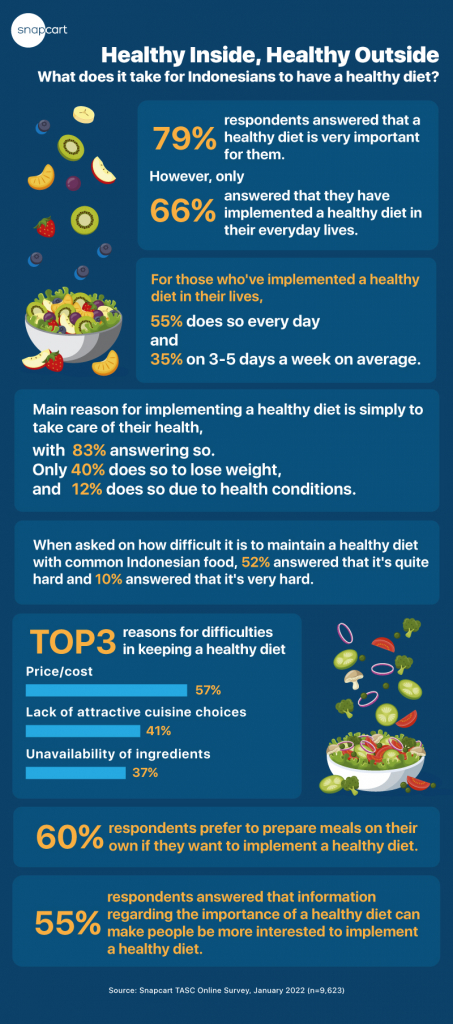Moving from the much beloved snacking and eating of Indonesian street food, to the soaring bubble tea craze in 2000s, the newest trend seems to have taken a different turn. Starkly different from the magnetic attraction towards devastatingly delicious food, the latest hype appears to lie in… healthy eating!
According to a report by Food Industry Asia (FIA) and research firm IGD in 2020, almost all consumers (99%) were interested in improving their diets [1]. This inclination seemed to have increased even more during the pandemic. Data from Bahtera Adi Jaya highlights that sales of healthy food on Tokopedia saw a six-fold increase in 2021. Yet at the same time, McDonald’s saw an increase of 170% in average daily transaction value [2].
So, junk food or healthy food? Let’s take a look at the answers from the locals.

Our research shows that a large majority (79%) find a healthy diet very important to them. However, only 66% have implemented a healthy diet in their everyday lives. It appears that the main reason for eating healthy is to take care of their health, as answered by 83%. Additionally, 40% of our respondents cited weight loss as a reason.
Considering the wide variety of famous Indonesian dishes that are deep-fried and high in carbs [3], it is rather unsurprising that majority of respondents (62%) found it quite or very hard to main a healthy diet with common Indonesian food.
One interesting point to note would be that female respondents generally face higher difficulty in maintaining a healthy diet. 54% of female respondents answered that they find it quite difficult to maintain a healthy diet with common Indonesian food compared to 46% of male respondents. In comparison, more male respondents (31%) than female respondents (28%) think that it is quite easy to do so.
In a previous survey done by Snapcart on losing weight, the most popular type of program selected by 80% of respondents was managed diets. Particularly, 83% of female respondents chose managed diets as their preferred method, compared to only 67% of male respondents.
Intriguingly, it appears that although female respondents are more likely to aim for weight loss via diets, more female respondents also find it harder to maintain a healthy diet.
UPMC shares the science behind this. According to their review in 2018, it is harder for women to lose weight. Due to a lower metabolic rate, physiologically, women have an harder time shedding excess weight. Coupled with societal norms, where restaurants serve equal portion size for everyone, perhaps the odds are slightly against women in terms of weight loss via dieting [4].
Sources:
[1] Most Indonesians are health conscious and are open to healthier product reformulation
[2] The Need for Health and Convenience Shape F&B Trends in Indonesia
[3] Is Indonesian Food Healthy? (3 Tips For Weight Loss)
[4] 4 Factors That Make It More Difficult for Women to Lose Weight





